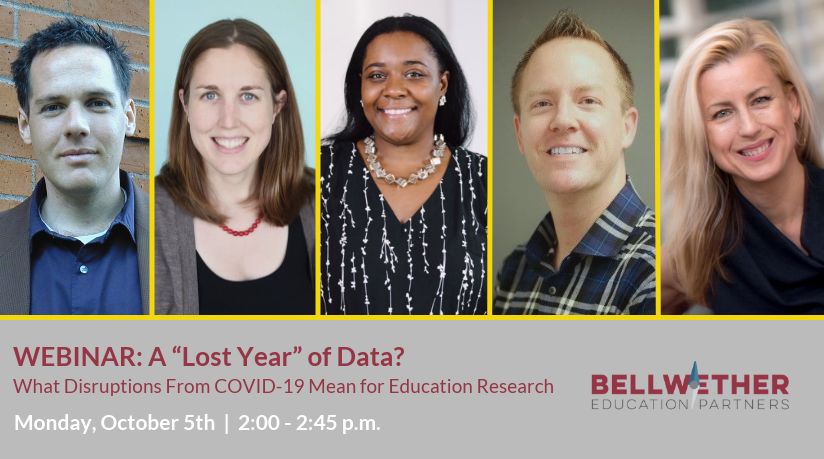The pandemic is not behind us. Delivery of education in schools continues to vary from state to state, district to district, and even school to school.
Research will be critical for figuring out what methods are working, how much learning is actually happening, and what innovations are showing early promise.
On October 5th, Bellwether Senior Adviser Allison Crean Davis gathered four accomplished education researchers to discuss how the pandemic has impacted education research, the emerging significant equity issues, and the future of education research. Complete captioned video is available here or below:
As researchers articulated how they are making sense of this moment, a few key themes emerged:
Missing Data — and Missing Students
Education researchers are already busy developing statistical models and simulations to account for “missing data,” i.e.,the lack of data from state assessments in spring 2020, which is typically used to measure student achievement from year to year. According to Megan Kuhfeld, Research Scientist at NWEA, researchers are discussing the multitudes of caveats and asterisks that will follow any conclusions based on what happened during the 2019-20 school year. The studies, models, and data will have to include significant nuance to capture the varied impact on students by subgroup, learning setting, access to technology, and attendance.
More pressing, though, than missing data is missing students. As Constance Lindsay, Assistant Professor at UNC School of Education pointed out, there are students who have not “shown up” since schools physically closed. We need to know where they are and who they are. From an equity perspective, it is important to understand the exacerbated effects of the pandemic on missing students’ learning and outcomes.
The 2019-20 and current school year are emerging as a new baseline to begin to capture “what happened.” Studies are being published, by Kuhfeld and others, with early estimates of learning loss in general and by some subgroups.
Funders and Researchers Need to be Flexible
Researchers will need to pivot from questions that may have been important pre-pandemic to what works, for whom, and when in the “new normal” and beyond.
Matthew Soldner of the U.S. Department of Education’s National Center for Education Evaluation provided an insider’s perspective on current federally funded research. Many researchers have had their existing federally funded study timelines extended in order to account for lack of data due to school closures and the cancellation of state assessments in spring 2020. He indicates that researchers are showing incredible innovation and adaptability, such as conducting site visits virtually and observing remote classrooms via webconference, as they continue their work in the face of the pandemic’s impact on the education system.
Kuhfeld agrees that in the modeling of the pandemic’s impact, researchers will need to consider the differential impacts of moving to remote schooling based on qualitative differences in delivery, access, and attendance. While a clear strategy has yet to emerge, it is an important consideration.
Consider Non-Education Factors
In the post-hoc analyses of the data we are able to collect, Soldner urged education researchers to incorporate sources from other fields in order to unpack the significant relationships between learning outcomes and economics, health, and even broadband speed. These mediating factors must be included.
In a researcher’s analytic design, Lindsay explains that the best way to account for this would be to define the pandemic as a contextual factor and account for its influence and impact. If it is possible to define and measure the “pandemic” variable, we can explore and control for its influence in learning. Currently, the question is not “do students learn well in remote environments?” The question is, to what extent does the pandemic relate to/influence the outcomes of students’ remote learning?
Look to the Future
The pandemic is likely to have long-term consequences for students. Dan Goldhaber of CEDR and CALDER has the long game in mind in terms of impact: “I don’t mean just achievement with regard to test scores, but everything from course-taking patterns, to the likelihood of being held back, to the likelihood of going on to college, and ultimately what happens in the labor market…it will be much more important to think about research in terms of student achievement trajectories than it has been.”
Panelists hoped that the pandemic has highlighted the interconnectedness of systems, from early childhood education to K-12 and beyond, to workforce and healthcare. Moving forward, an interconnected systemic approach is needed. If we do it right, Soldner hoped, “I can’t imagine that [schooling and education research in] 2024 will look anything like 2019.”
Watch the video here, and sign up for our newsletter to learn more.
October 9, 2020
Four Speakers and Four Themes From Our “Lost Year” Webinar
By Bellwether

Share this article